Equifax Hack: What You Need to Know

In a press release on September 7, Equifax, a national credit-reporting company, announced that an estimated 143 million U.S. consumers could be affected by a cybersecurity attack carried out by suspected criminal hackers. The hacking is estimated to have occurred from mid-May through July 2017 and breached data includes names, Social Security numbers, birth dates, addresses and, in some instances, driver’s license numbers.
Equifax has established a dedicated website, www.equifaxsecurity2017.com, to help consumers determine if their personal information has been potentially impacted. If you’re affected by the incident, you will be offered an enrollment with TrustedID Premier. The decision to enroll is entirely up to you.
At a minimum, you should consider a security freeze and/or fraud alert.
A security freeze prevents creditors from accessing your credit report unless you lift or remove the freeze. You will need to contact each nationwide consumer reporting agency to place or remove a security freeze.
- Equifax – 1.800.349.9960 or www.freeze.equifax.com/Freeze/
- Experian – 1.888.397.3742 or www.experian.com/freeze
- TransUnion – 1.888.909.8872 or www.transunion.com/freeze
Fees vary based on where you live, your age and whether you’re an identity theft victim, but typically range from free to $10. After receiving your freeze request, each credit reporting agency will send you a confirmation letter containing a unique PIN (personal identification number) or password. Keep each PIN or password in a safe place as you will need it if you choose to lift or remove the freeze.
A fraud alert is a notification that you can request to be placed on your credit report by a nationwide consumer reporting agency that warns creditors that you may be a victim of identity theft. This serves as a “red flag” for third parties that may consider extending you credit. Contact the fraud department of one of the three credit bureaus to place a free, 90-day fraud alert. The reporting bureau will notify the other two companies on your behalf.
Lastly, you should take steps to be vigilant in reviewing your account statements and credit reports, and immediately report any unauthorized activity to your financial institution.
